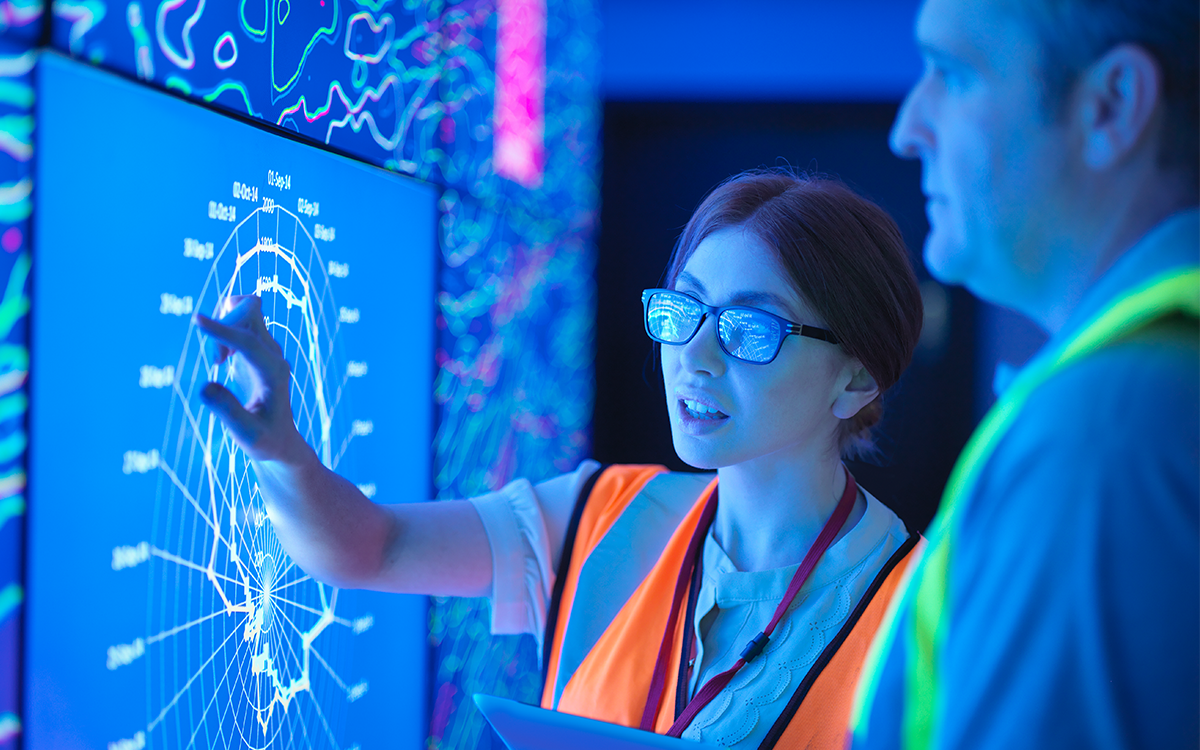The Connected Frontline Officer - Harnessing AI for Social Good
Fujitsu / December 7, 2023
We’ve discussed the digital transformation in the frontline worker sector for a number of years now, but the current evolution in the law enforcement landscape is starting to etch a distinctive future for the relationship between police officers and society. Just this week the reports of Dubai Police deploying driverless, AI powered patrol cars has captured the imagination of many. How does this balance between technological advancement and societal need evolve?
The World Economic Forum examines the Materiality impact of People, Planet and Prosperity as part of sustainable value creation and Fujitsu has embraced this Materiality focus to guide the management and investment decisions that are made within the business. These focus areas are important to ensure that not only is there a direct economic benefit, but that the holistic well-being of individuals, the safeguarding of our environment, and the long-term prosperity of communities are prioritized. By intertwining these pillars with our business strategy, Fujitsu aims to drive meaningful change and create resilient, inclusive systems that benefit all stakeholders.
The topic of AI within our everyday lives, including policing is very topical with The World Economic Form recently examining the question of Is AI a Force for Good? Taking the lens of law enforcement transformation, the pillars of materiality can provide a much needed balance in the technology decision making process to ensure that a broader definition of “value” is considered, taking into account the social good that can be achieved.
People: Building Stronger Community Bonds and Ensuring Accessibility
Real-time data analysis has changed the game for officers actively investigating misdemeanors and serious crimes. AI Assistance in the field can employ voice recognition to simplify data input for officers, with algorithms highlighting connections between suspects, vehicles, geo-locations, and other relevant data. This accelerates investigations, relieves the burden on human capital during investigations and cuts down on the paperwork required when officers return to the station to file reports and process the administrative side of policing. If we can alleviate this heavy manual activity, then there will be more time available for officers to engage in active investigations, to support community-based policing activities and protect the quality of life and opportunities across society to support the well-being of people in their jurisdiction.
For citizens, AI provides the ability to report non-urgent crimes which can be a game-changer. Instead of grappling with prolonged bureaucratic procedures, they interact with a system capable of assessing, triaging, and even commencing the initial steps of investigations.
This type of AI assisted crime reporting allows citizens and businesses to engage with law enforcement with a minimal impact to their daily lives, improving customer and consumer experience. This reduction in overhead allows a digital society to optimize prosperity with streamlined processes and maximizes officer activity in the most needed areas of policing.
Continuing the theme of maximizing the convenience of interactions between citizens and law enforcement, there is no reason why AI powered community policing terminals could not be stationed in community settings like libraries. This initiative would enable even those less tech-savvy or with limited access to technology to engage with law enforcement, promoting inclusivity and reducing the digital divide.
Concluding the focus on People, a particular highlight is the Video based artificial intelligence, deployed to maximize the safety of citizens in urban areas, or even in waterways and other un-manned areas. A solution that can discern unsafe behaviors proactively without human intervention, proactively triggering and dispatching responses when required. These systems not only enable early intervention but discourage antisocial actions, given the public's awareness of intelligent surveillance.
Planet: Protecting Our World
Illegal activities, such as wildlife poaching or illicit logging, pose significant threats to our environment. Given the finite human capital of each law enforcement agency and the need to address labor shortages, the Planet theme provides an abundant focal area to deploy transformed law enforcement solutions for the benefit of all climate change, nature loss, wildlife protection and more.
Consider the geographical challenge of protecting and enforcing laws in place to protect the planet, with millions of kilometers of ground to cover, any help that can be provided to enforcement officers will provide benefits.
Through AI-powered surveillance, officers can receive real-time alerts about potential threats in sensitive regions. Drones’ technologies equipped with AI can distinguish between wildlife and human intruders, along with identifying malicious or natural environmental disasters such as oil leaks in ports, or arson in bushfire prone areas. The safe adoption of these solutions will enhance the protection for our planet's endangered zones.
Prosperity: Paving the Way for a Thriving Digital Society
Safety and prosperity go hand-in-hand. The increasing sphere of AI in law enforcement underscores this relationship, transforming the way we approach safety. When officers wear body cameras, they capture real-time evidence, which, coupled with Video Behavior Analytics, can be trained to identify threats. There are clear challenges in the quality of image required to perform AI video analytics, but the growing investments in high fidelity, low bandwidth technologies will bring the feasibility of this solution closer to practical reality. By embedding ethical AI and IT, law enforcement can continue to build a foundation for a trusted digital society where stability and global prosperity connect.
Data Privacy, Surveillance, and Society’s Trust
With the increasing reliance on AI and data-driven decision models, concerns about data privacy and the potential misuse of surveillance tools inevitably arise. Balancing public safety with individual privacy rights is critical. In many countries a true operational deployment of AI to support officers in the field is exceptionally challenging, protecting the rights of individuals, working with the limits of data sharing between agencies and maintaining a safe environment for frontline officers is and will continue to be a delicate balancing act. As AI systems become more integrated into daily law enforcement operations, establishing clear guidelines, transparent processes, and robust accountability mechanisms becomes imperative.
While the promise of AI in enhancing operational efficiency and effectiveness is undeniable, it must not be at the expense of eroding public trust. A key aspect is ensuring that AI systems in law enforcement are designed and used in ways that are both ethical, explainable and respect human rights. This includes implementing algorithms that are free from biases, regularly audited for accuracy and fairness, and are transparent in their decision-making processes.
Furthermore, fostering collaboration and open dialogues with the public and various stakeholders is crucial. By actively engaging communities in discussions about how AI and surveillance tools are used, law enforcement agencies can build trust, address concerns, and co-create solutions that respect both individual rights and collective security needs.
The future of AI in law enforcement looks promising, but it will require a concerted effort from policymakers, technologists, law enforcement agencies, and the public.

Editor's Picks












